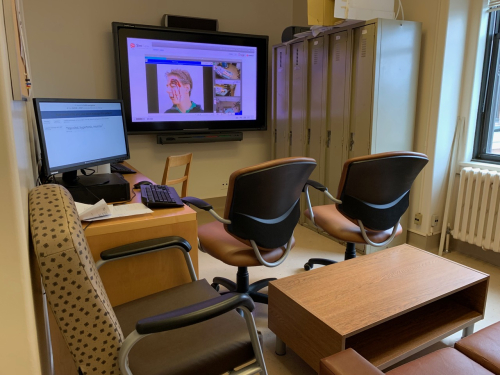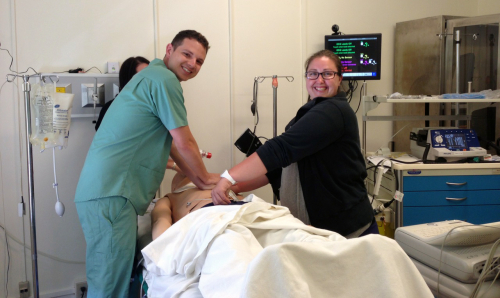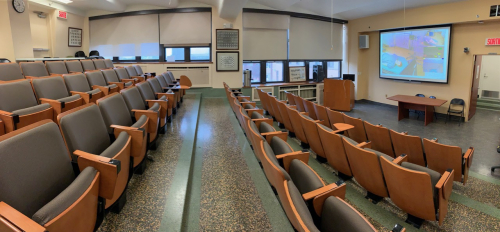The Emergency Medicine (EM) Simulation Program at the Jewish General Hospital (JGH) invites Emergency Medicine students, residents and staff to controlled “simulated” scenarios emulating real-world emergency medical situations. These simulated events occur “in-situ” in the ER or our JGH Simulation Centre. These exercises promote a dynamic multidisciplinary team approach to care for a simulated patient or life-like mannequins by the Emergency Department healthcare team. The goal is that lessons learned will be translated to delivering effective and comprehensive care to real patients by fostering better multidisciplinary teams. The Emergency Medicine Simulation Program has a team of 5 simulation educators, including 4 doctors and 1 nurse, and involves a myriad of multidisciplinary professionals. Participants are given the opportunity to apply their knowledge and skills in an experiential learner-centred environment. Healthcare team members are encouraged to summarize and share their mental model thereby exercising effective leadership and followership. Simulation-Based Education (SBE) provides an error-tolerant and safe environment for the team to practice, where real patients are not at risk. All learners agree that errors are best to occur in the simulation environment rather in the clinical setting. Furthermore, the participants are instructed that though the scenarios are often modelled on clinical events, the cases are often intentionally made more difficult. By stressing and reinforcing the “learning contract” to all the participants, members are receptive to the learning process and the feedback received during debriefing. This learning contract stresses that all participants are intelligent, motivated, wish the best for their patients and want to improve. Debriefing is an extremely important component of the educational process, where participants are able to further explore what went well, and aspects of the scenario which could be improved.

Our JGH EM Simulation Centre includes a high fidelity Laerdal SimMan manikin connected to a SimView server with 3 video cameras, microphones and speakers, and a simulated patient monitor. We broadcast a composite of multiple video feeds of the healthcare team with hi-quality audio to observers in a remote location or an adjacent conference room. As well, we display the patient monitor, EKG’s, CXR, ultrasound video clips to both the participant in the simulated treatment area and the observers in the remote location.
In June 2018, the Emergency Medicine Simulation Team developed an “in-situ” simulation event involving Emergency, Neonatology and Gynecology physicians and nurses, Respiratory Therapy and Paramedical Unit Coordinators. This event was featured in the JGH eNews in August 2018. Fidelity and realism were made possible with excellent planning and comprehensive pre-briefing of confederates participants (those persons who knew the script and were involved as participants). Furthermore, to assure observers did not disrupt the realism, videoconferencing “premiered” the simulation event. The pre-briefing orientation to participants (as well as the live audio-visual feeds) was broadcasted to four different Hospital conference rooms. Thus, the multidisciplinary teams were blinded to each other participation. Participants and all personnel were pre-briefed to the concepts of crisis resource management (CRM), and the emotional security and safety of the staff involved secured with the “learning contract”. A summary of lessons learned was enthusiastically endorsed and effected protocol modifications and new equipment procurement.

The Jewish General Hospital Emergency Medicine (JGH EM) Simulation Program works jointly with the McGill University’s Emergency Medicine Residency Program Directors and Chief Residents to assure the simulation program complements the residency training curriculum. Simulation-based educational (SBE) activities are especially helpful with respect to the management of rare presentations and topics in which timely coordinated care is paramount. Furthermore, the JGH EM Simulation Program Director, Dr. Errol Stern, is a member of the Quality Improvement (QI) Committee, with the aim of incorporating SBE into our Hospital QI Program. By examining the root causes of recurrent errors or critical incidents and applying SBE to appropriate issues in the Simulation lab and in-situ, we hope to mitigate harm and improve healthcare delivery and team communication skills during crisis interventions.
The JGH EM Simulation Team:
Dr. Errol Stern, Director of the JGH EM Simulation Program
Dr. Kamy Apkarian
Dr. Haran Balendra
Dr. Julia Bernard
Ms. Melanie Sheridan
